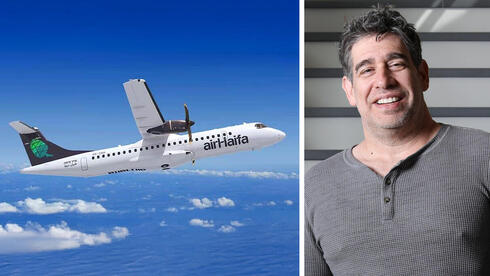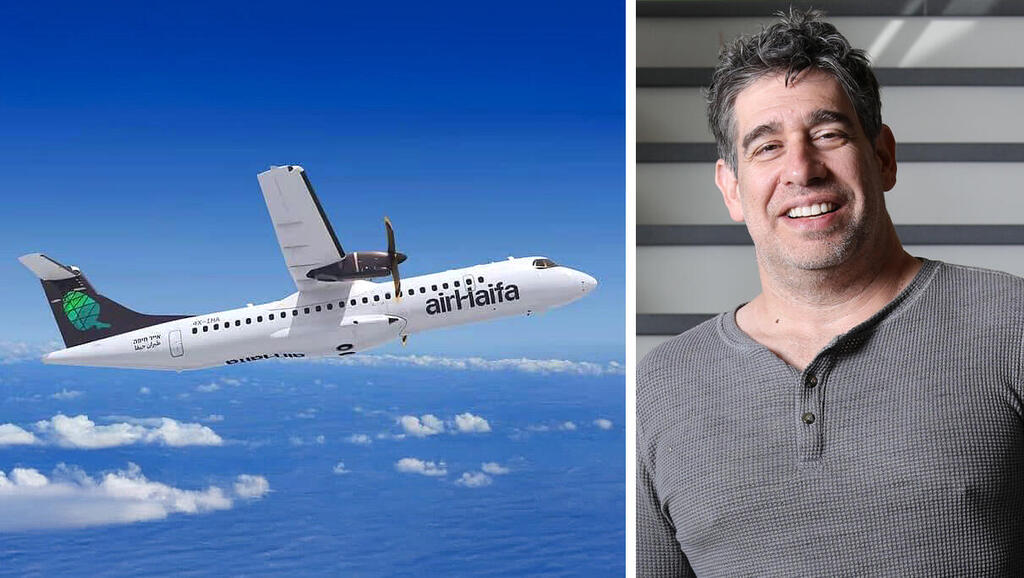
Why is Palo Alto's founder launching a low cost airline?
Low-cost Air Haifa, in which Palo Alto Networks’ founder Nir Zuk is the sole investor, will receive its first plane at the end of the month. The airline aims to offer residents of northern Israel convenient flights to Greece and Cyprus.
Air Haifa, a new low-cost Israeli airline, has announced the arrival of its first of three planes to Haifa International Airport at the end of the month. With ongoing conflicts in the north and the potential for regional escalation, the timing of its operations has raised eyebrows among senior aviation industry officials. Air Haifa will be the fourth airline in Israel, joining EL AL, Israir, and Arkia, and the first to open since 1989. It is expected to receive its operating license from the Civil Aviation Authority and will begin selling tickets to nearby Mediterranean destinations and Eilat.
The sole investor in Air Haifa is cyber billionaire and Palo Alto Networks founder Nir Zuk, who owns 57% of the company. Its management includes former senior executives at El Al, including ex-CEO Gonen Usishkin, former Chief Commercial Officer Michael Strassburger, and Lior Yavor, former VP of operations at El Al. The company has about 15 managers, some of whom are shareholders. Usishkin, Yavor, and Strassburger each own 11% of ordinary shares and are founding partners. Other shareholders include Shai Babad, former CEO of the Treasury and current CEO of Strauss (4.9%), Matry Meiri, a trust company (4.4%), and Rafi Danieli, former CEO of Zim (0.4%).
1 View gallery


Nir Zuk (right) and Air Haifa plane
(Photo: Palo Alto Networks, plane imaging courtesy of ATR)
Over four years ago, with the outbreak of the pandemic that shook the global aviation industry, Danieli served as a special advisor to EL AL, guiding its moves with the Ministry of Finance regarding a government aid program that saved it from collapse. At that time, Babad, the Director General of the Israeli Ministry of Finance, and Danieli had a prior acquaintance from their shared past at the Zim shipping company.
In recent days, Air Haifa launched its website, offering jobs for flight attendants and pilots. However, the company has not specified the number of employees it plans to hire for the start of operations. Unlike EL AL's fleet of dozens of planes, Air Haifa will operate on a smaller scale with a limited fleet. The first plane, an ATR 72-600, will be delivered in about two weeks, with two more following in the subsequent months. These turboprop planes, manufactured by Airbus subsidiary ATR in Toulouse, France, each have 72 seats and are designed for regional traffic from Haifa's small airport with a short runway. The price of one plane is estimated at about $40 million. Air Haifa plans to use a mix of ownership and leasing for its fleet, operated by small outsourced teams.
The idea to establish Air Haifa began about two and a half years ago, spearheaded by Usishkin and Babad, who sought investors to bring in capital. Babad, for now, is not expected to play any role in the airline, with Zuk being the sole investor. "I invested in the airline alone," Zuk said recently in a conversation with Rakefet Russak-Aminoach on her podcast, "The Decision." According to him, "The other names being mentioned are not part of the investors. Some are working on the project, and some were with us at the time of establishment and are no longer part of it. Other investors decided not to invest due to the regulatory challenge, not the business plan."
This regulatory challenge includes skepticism from investors about obtaining the necessary licenses from the Ministry of Transportation, affecting their willingness to risk money. The scope of Zuk's investment in Air Haifa is unknown, but during the initial fundraising, a target of approximately $50 million was set. When Russak-Aminoach noted that she would have warned her bankers against providing credit for such a venture in her previous position at Leumi, Zuk expressed confidence in the model. He believes the target audience of about 3.5 million people in Hadera and the north will prefer taking off from Haifa to nearby destinations like Cyprus, Greece, and Eilat. He cited the profitability of European and American low-cost airlines as a positive example and dismissed concerns about aviation losing money.
Zuk stated that the profit potential in the aviation industry lies in minimizing operating costs, using appropriately sized planes, and maximizing outsourcing. He criticized the inefficiency of handling planes within a small airline and the high salaries and reduced work hours of pilots in Israel. Zuk said he does not expect large profits from Air Haifa but would be satisfied if it meets the needs of millions living in the north, making life easier for them. He views his investments in Israel as "philanthropy with a chance of profit or self-sustainability."
Air Haifa has not yet revealed its business plan or how it intends to profit with three small planes flying to nearby destinations from a small airport inactive at night. It is also unclear if it will operate on weekends and Israeli holidays. In response to Calcalist's question on the subject, the company provided a vague answer, stating it would plan flights according to customer needs while considering Israeli tradition.
Despite market skepticism, Air Haifa's senior executives see advantages in the circumstances. "It's all a matter of perspective," Strassburger told Calcalist. According to him, "A plane with 72 seats can operate many times a day on the same route, serving business people and others who want to fly at fixed times. We can serve these routes because we have small planes, not 170-seat planes that need to be filled to be profitable."
Air Haifa's list of destinations does not include Turkey, not only due to the political crisis and collapse of demand since the war in October but also because it was not planned as a destination for the next two years. The airline aims to capitalize on the strong demand for flights to Cyprus and Greece, which are popular for travelers seeking close vacation spots.
The company received its commercial license from the Ministry of Transport last September. Until it receives its operating license this September, Air Haifa has refrained from pre-selling tickets and disclosing prices. The company wants to prevent delays in receiving the license from affecting its flight schedule from the start. "Until now, we have worked under the radar, avoiding over-promising. Until we start selling tickets, there's no point in discussing prices," Strassburger told Calcalist. "We will offer affordable, competitive prices. We won't see flights to Cyprus for 10 or 20 euros, but the prices will be fair and legitimate."
Air Haifa intends to manage ticket sales through its website, allowing customers to postpone flights with 24 hours' notice. Direct sales should help offer attractive prices without middlemen taking a cut. The company also plans to avoid expensive marketing campaigns and celebrity endorsements to reduce costs.
However, the promises will face real-world challenges. Since the beginning of the war, many security guards at the airport authority have been recruited into IDF reserves, stretching operational capabilities. With a small fleet, any aircraft malfunction could create significant delays, potentially requiring Air Haifa to transport passengers by bus to Ben-Gurion airport for alternative flights.
Past attempts to create similar routes from Haifa by airlines like TUS, Israir, and Arkia have failed. "A person with a height of 1.60 meters cannot be a basketball player," a market executive said about Air Haifa's plans. "It's an experiment that failed because the field in Haifa is not economical. Today, it is mainly used for helicopter services to Mediterranean gas rigs. Instead of expanding its runway to allow real planes, we gave the area to the Chinese cargo port, burying that option."
In general, the aviation industry is unsure there is room for a fourth airline in Israel. Israir CEO Uri Sirkis has previously said that even three airlines are too many. "In the current format, Air Haifa has no chance of surviving unless it also operates from Tel Aviv, allowing it to fly larger planes, sell packages, and transport more passengers," said an airline executive.
Air Haifa remains tight-lipped about its future plans and fleet expansion but hints that three planes are just the beginning. With a mega-investor like Zuk and a management team of ex-El Al executives, Air Haifa's venture may have a rationale that will become clear once it presents its business plan.














